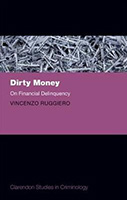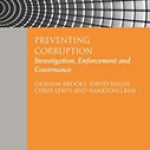Dirty Money: On Financial Delinquency

Author: Vincenzo Ruggiero
Publisher: Oxford, UK; New York: Oxford University Press, 2017. 268p.
Reviewer: Steve Tombs | July 2017
Criminologies of various types tend still to associate offending with want on the part of those doing the offending. Yet as a criminological gaze upwards at the powerful highlights, and as Vincenzo Ruggiero documents here, the most significant crimes and harms – including those with the potential to break societies apart – should be attributed to abundance rather than scarcity.
From financial crisis to financial crisis (some very well known, others less so), spanning the globe, across disciplines in the social sciences and beyond, and via explanation after explanation, this book is a rather breakneck tour through a history of financial crime. From the Prophet Ezekiel’s view that usury should be equated to rape (Chapter 2), Ruggiero leads us through the work of Bunyan, Milton, Dante, Wagner, Weber, George Bernard Shaw, Freud, Durkheim, Tarde, Keynes, to name but a few, as well as virtually every ‘classic’ criminologist, as he reviews academic and cultural framings of financial crimes and delinquency from Biblical through contemporary times. If this is, as the General Editors state in their introduction, a journey, it is an exhaustive and indeed exhausting one.
As familiar as much of the material herein feels to those of us who focus upon corporate, state and white-collar crimes, Ruggiero notes that criminology has focussed relatively little attention on financial crimes, or at least explicitly so. So, for example, he notes that most critical criminologists have ended up focussing on conventional offenders, and that, indeed, “[i]n most key books published between the 1960s and 1970s, the heyday of critical criminology, the words ‘bank’ and ‘financial crime’ did not even appear in the detailed final indexes” (page 124).
Taken together, the titles of the nine substantive chapters here – ‘Money and Salvation’, ‘Between Sin and Crisis’, ‘Bankers and Robbers Barons’, ‘Black Tuesday and Beasts of Prey’, ‘Incompetent Muddlers and Organization Men’, ‘A Paper World’, ‘Psychopaths and Thrills’, ‘Various Shades of Grey’ and ‘The Hidden Wealth of Nations’ – indicate accurately the focus and scope of the book. As we reach its close, and come to the contemporary era, the object of the book, dirty money, becomes so fuzzy, so elusively rapid, so stateless, so untraceable and ephemeral that it virtually disappears. This in itself helps to explain how, in total, this text offers what Ruggiero refers to as “a `diagnosis’ rather than a cure” (page 224). The curt (five-page) concluding chapter is characterised by pessimism that the litany of theft and fraud documented in the preceding pages is about to be mitigated any time soon. Indeed, for Ruggiero, preventing financial crimes looks ever less likely as the actors, aiders and abettors in the world of corporate crime enter increasingly symbiotic relationships with the criminal entrepreneurs of organised crime. Thus corporate and organised crime, with the connivance of the state, meld ever more into what Frank Pearce termed over 40 years ago ‘The Crimes of the Powerful’.
As Ruggiero notes, this book is not a history of the origins and nature of money – but if “money expresses the violence inherent in social relations” (pages 4-5), then Dirty Money chronicles the most excessive and enduring forms of violence.
Steve Tombs, Professor of Criminology, The Open University


